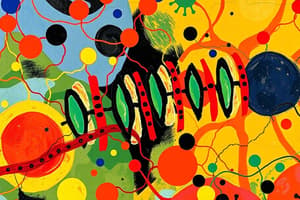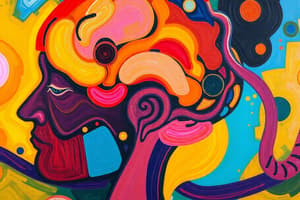Podcast
Questions and Answers
What genetic factor is associated with longevity according to Centagenetix's research?
What genetic factor is associated with longevity according to Centagenetix's research?
- Telomerase gene activity
- Superoxide dismutase gene mutations
- Gene identified on chromosome 4 (correct)
- Gene SIR2 found in nematode worms
Which company focuses on creating drugs that can mimic the activity of specific proteins related to longevity?
Which company focuses on creating drugs that can mimic the activity of specific proteins related to longevity?
- Eukarion
- Geron Corporation
- Centagenetix (correct)
- Elixir
What outcome did genetically engineered mice produced by Eukarion experience?
What outcome did genetically engineered mice produced by Eukarion experience?
- Ability to survive without telomerase
- Increased cellular activity promoting longevity
- Extended lifespan due to enhanced antioxidant levels
- Rapid death within a week without superoxide dismutase (correct)
What was the primary goal of the anti-glycation drugs being developed by Alteon?
What was the primary goal of the anti-glycation drugs being developed by Alteon?
How does telomerase activity relate to potential anti-ageing therapies being explored by Geron Corporation?
How does telomerase activity relate to potential anti-ageing therapies being explored by Geron Corporation?
What is the primary definition of ageing as indicated?
What is the primary definition of ageing as indicated?
Which of the following terms is defined as the maximum age that can be attained by a species?
Which of the following terms is defined as the maximum age that can be attained by a species?
Which factor is NOT associated with the wear and tear theory of ageing?
Which factor is NOT associated with the wear and tear theory of ageing?
Which of the following substances is classified as an extracellular antioxidant?
Which of the following substances is classified as an extracellular antioxidant?
How does protein glycation affect proteins in the elderly?
How does protein glycation affect proteins in the elderly?
What is the primary consequence of the accumulation of abnormal proteins within cells during aging?
What is the primary consequence of the accumulation of abnormal proteins within cells during aging?
What impact do antioxidants have on the effects of free radicals?
What impact do antioxidants have on the effects of free radicals?
Which of the following statements about programmed aging is accurate?
Which of the following statements about programmed aging is accurate?
Which statement about lipofuscin is accurate?
Which statement about lipofuscin is accurate?
What decline is NOT associated with cellular aging?
What decline is NOT associated with cellular aging?
What happens to free radical damage and antioxidant defenses with age?
What happens to free radical damage and antioxidant defenses with age?
How does ageing affect the immune system?
How does ageing affect the immune system?
Which of the following changes in the lungs is associated with aging?
Which of the following changes in the lungs is associated with aging?
What is a consequence of the decline in kidney function due to aging?
What is a consequence of the decline in kidney function due to aging?
Which alteration in the cardiovascular system is common with aging?
Which alteration in the cardiovascular system is common with aging?
What effect does aging have on the liver's capacity for drug detoxification?
What effect does aging have on the liver's capacity for drug detoxification?
Which of the following statements accurately describes the impact of aging on muscles?
Which of the following statements accurately describes the impact of aging on muscles?
What characterizes progeria, and which of the following is a clinical presentation of this disorder?
What characterizes progeria, and which of the following is a clinical presentation of this disorder?
Which of the following is a known effect of calorie restriction in mammals?
Which of the following is a known effect of calorie restriction in mammals?
What is an accurate statement regarding the changes occurring in the brain due to aging?
What is an accurate statement regarding the changes occurring in the brain due to aging?
In the context of aging, what happens to one’s body composition?
In the context of aging, what happens to one’s body composition?
Which of the following elements is associated with the management of progeria?
Which of the following elements is associated with the management of progeria?
What is NOT a characteristic of the eye aging process?
What is NOT a characteristic of the eye aging process?
What is a significant outcome of amyloid deposition increase in the aging brain?
What is a significant outcome of amyloid deposition increase in the aging brain?
Flashcards
Life Expectancy
Life Expectancy
A measure of the average age at which individuals in a population die.
Lifespan
Lifespan
The maximum age attainable by a species.
Senescence
Senescence
The natural process of decline in physiological function associated with aging.
Free Radicals
Free Radicals
Signup and view all the flashcards
Glycation
Glycation
Signup and view all the flashcards
Lipofuscin
Lipofuscin
Signup and view all the flashcards
Antioxidants
Antioxidants
Signup and view all the flashcards
Superoxide Dismutase (SOD)
Superoxide Dismutase (SOD)
Signup and view all the flashcards
Gene Cloning
Gene Cloning
Signup and view all the flashcards
Longevity Gene
Longevity Gene
Signup and view all the flashcards
Advanced Glycation End Products (AGEs)
Advanced Glycation End Products (AGEs)
Signup and view all the flashcards
Telomere
Telomere
Signup and view all the flashcards
What is lipofuscin?
What is lipofuscin?
Signup and view all the flashcards
What is the Error-Catastrophe Theory of aging?
What is the Error-Catastrophe Theory of aging?
Signup and view all the flashcards
Define the Hayflick Limit in aging.
Define the Hayflick Limit in aging.
Signup and view all the flashcards
What are telomeres and their role in aging?
What are telomeres and their role in aging?
Signup and view all the flashcards
What is telomerase and its role in aging?
What is telomerase and its role in aging?
Signup and view all the flashcards
What are gene mutations and their influence on aging?
What are gene mutations and their influence on aging?
Signup and view all the flashcards
What happens to mitochondria with aging?
What happens to mitochondria with aging?
Signup and view all the flashcards
What happens to the immune system with aging?
What happens to the immune system with aging?
Signup and view all the flashcards
Muscle Atrophy in Aging
Muscle Atrophy in Aging
Signup and view all the flashcards
Endocrine System Changes in Aging
Endocrine System Changes in Aging
Signup and view all the flashcards
Brain Changes in Aging
Brain Changes in Aging
Signup and view all the flashcards
Eye Changes in Aging
Eye Changes in Aging
Signup and view all the flashcards
Body Composition Changes in Aging
Body Composition Changes in Aging
Signup and view all the flashcards
Progeria (Hutchinson-Gilford Syndrome)
Progeria (Hutchinson-Gilford Syndrome)
Signup and view all the flashcards
Calorie Restriction
Calorie Restriction
Signup and view all the flashcards
Anti-Aging Therapy
Anti-Aging Therapy
Signup and view all the flashcards
Study Notes
Ageing Theories and Disease
- Ageing defined as a decreasing ability to survive.
- Importance includes reduced work ability, increased disease susceptibility, and high healthcare demands.
- Life expectancy is the average age at death, while lifespan is the maximum age attainable by a species.
Features of Ageing
- Senescence: Changes associated with ageing that can cause or increase susceptibility to age-related diseases.
- Age-related diseases linked to senescence changes.
Ageing Theories
- Wear and Tear: A theory proposing that ageing is caused by accumulated damage from use over time.
- Free Radicals: Highly reactive molecules with unpaired electrons that damage DNA, proteins, and cells. Sources include phagocytic cells, radiation, smoking, and oxidation-reduction reactions. Antioxidants, like vitamin E and superoxide dismutase, are substances that delay oxidation to counter free radicals.
- Glycation: A process where glucose attaches to proteins, causing cross-linking, altered enzyme activity, and other functional changes, particularly relevant in the elderly due to glucose intolerance and diabetes.
- Waste Products: Accumulation of byproducts, like lipofuscin (a lipid-rich pigment giving cells a brownish yellow colour), which cannot be easily removed, potentially contributing to cell damage.
- Error-Catastrophe Theory: Suggests that random errors in DNA transcription/translation lead to abnormal protein production, impairing cell function.
Genome-Based Ageing
- Programmed Ageing: The idea that ageing is a predetermined process regulated by genes.
- Hayflick Limit: A fixed limit on the number of cell divisions.
- Telomeres: Protective caps at the ends of chromosomes that shorten with each division, limiting further division, and telomerase counteracts this shortening.
- Gene Mutations: DNA replication errors not repaired can cause cellular impairment and mutations. DNA repair systems decrease with age.
Cellular Ageing
- Decline in mitochondrial activity, oxidative phosphorylation, DNA/RNA synthesis, nutrient uptake, and chromosomal repair; these all contribute to decline in cell function throughout the body.
- Accumulation of waste products.
- Change in organelle shapes.
Immune System Ageing
- Reduced antibody production and T-cell function.
- Thymus atrophy (shrinkage).
- Increased autoimmune reactions.
Skin Ageing
- Increased wrinkling.
- Changes in pigmentation causing greying and hair loss.
- Delayed wound healing.
Lung Ageing
- Reduced lung size and elasticity.
- Decreased gaseous exchange and capacity for strenuous work.
Cardiovascular System Ageing
- Increased blood vessel rigidity and arterial calcification/hardening.
- Increased blood pressure.
- Accumulation of fibrous tissue in the heart.
- Reduced cardiac output and blood supply to tissues.
Kidney Ageing
- Decreased kidney weight/volume.
- Loss and replacement of nephrons with scar tissue.
- Reduced renal filtration rate and waste elimination.
Liver Ageing
- Reduced liver size and hepatocyte function (e.g., drug detoxification).
Muscle Ageing
- Muscle atrophy.
- Reduced work capacity.
Endocrine System Ageing
- Decreased hormone production and receptor function.
Brain Ageing
- Loss of weight and nerve cells.
- Increased amyloid deposition and lipofuscin accumulation.
Eye Ageing
- Reduced lens flexibility and potential lens protein cross-linking.
Body Composition Ageing
- Loss of muscle mass.
- Increase in body fat.
Progeria
- Accelerated ageing disorder affecting children.
- Rare with a severe decrease in life expectancy.
Calorie Restriction
- A potential method for slowing ageing.
- Research suggests it may extend lifespan and delay age-related diseases in numerous species.
Anti-Ageing Therapy
- Research efforts focused on identifying and targeting genes/processes associated with longevity and slowing ageing.
- Companies pursuing include Centagenetix, Elixir, Eukarion, Alteon, and Geron Corporation.
Studying That Suits You
Use AI to generate personalized quizzes and flashcards to suit your learning preferences.




